Items
topic_interest is exactly
history
-
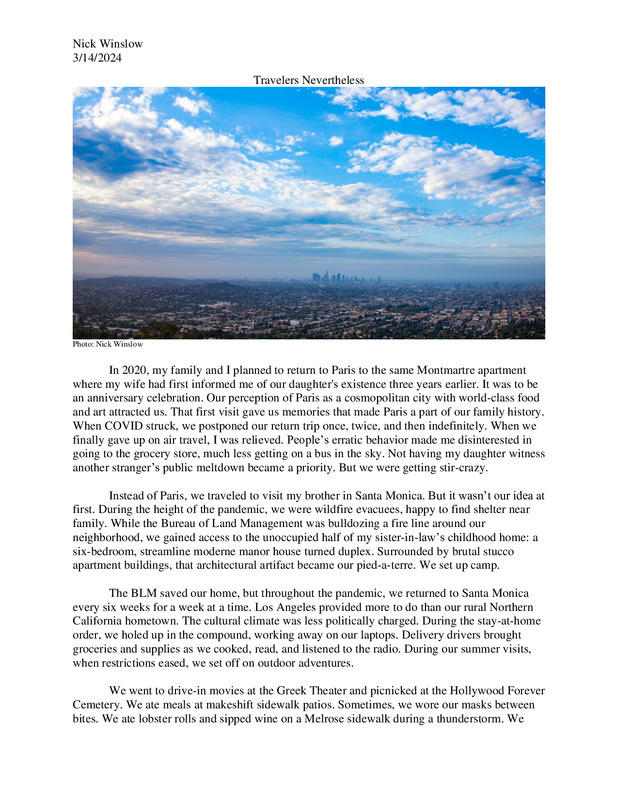 2020-03-22
2020-03-22Travelers Nevertheless
Faced with the impossibility of international travel during the COVID-19 pandemic, my family embarked on an unplanned intrastate adventure that led to a deeper appreciation for the city of Los Angeles and for family members that call that city home. Along with posing serious day-to-day challenges, the pandemic created opportunities for new relationships with people and places. -
2021-07-01
Falling In Love With Chicago
As the world slowly emerged from the grip of the COVID-19 pandemic, life began to regain a semblance of normalcy. With restrictions lifting and vaccinations becoming widely available, my family eagerly embraced the opportunity to reunite with loved ones and explore the world beyond the confines of our home. After our children became eligible for the COVID-19 vaccine, my husband and I decided to embark on a memorable journey to visit family in Chicago. The decision was influenced by the fact that Illinois had taken the pandemic seriously, and the situation seemed relatively stable. The excitement in the air was palpable as we packed our bags and set off on the adventure. The journey itself became a testament to newfound hope and optimism, a stark contrast to the anxiety-ridden days of lockdown. The rhythmic hum of the Amtrak train and the gentle swaying of the carriages created a soothing backdrop to our anticipation. After almost three days on the train, we finally reached our destination. As we settled into the rhythm of Chicago life, we found ourselves enchanted by the city's rich history and vibrant culture. The streets echoed with the footsteps of generations past, and the architecture told stories of resilience and progress. Our children's eyes widened with each new discovery, absorbing the lessons of the past and the beauty of the present. The museums became classrooms, and the parks transformed into playgrounds of learning and exploration. From the towering skyscrapers to the serene shores of Lake Michigan, Chicago opened its arms wide, inviting our family to immerse ourselves in its tapestry of experiences. Over the course of two weeks, we marveled at the diversity of the city, the pulsating energy of its neighborhoods, and the friendliness of its people. The world-class museums, the iconic Millennium Park, and the deep-dish pizzas became integral parts of our family's collective memory. The reluctance to leave grew with each passing day, as Chicago had become more than a destination; it had become a second home. The connections made, the lessons learned, and the memories forged painted a picture of a city that had welcomed our family with open arms. As we boarded the Amtrak train to return home, a mixture of gratitude and nostalgia-filled our hearts. Chicago had been a beacon of joy and discovery during a time when the world needed it most. The journey had not just been about a visit; it had been a transformative experience, a reminder that even in the face of adversity, there was always the possibility of finding beauty, connection, and a sense of belonging. The trip to Chicago amid the COVID-19 pandemic symbolizes a shift from a period of uncertainty and isolation to one of hope, reconnection, and exploration. That being said, the nervousness still set the undertone to the trip. The eligibility and administration of COVID-19 vaccinations mark a significant turning point in our family's ability to travel. It really shows the importance of vaccines as a tool for regaining a sense of freedom and the ability to engage in activities that were restricted during the height of the pandemic. The exploration of Chicago's history, culture, and landmarks communicates our desire for new experiences and rediscovery of the beauty in the world. The trip became almost like a metaphor for the broader human experience of seeking joy, adventure, and learning, even after enduring a period of hardship. As we chose to travel to a location where the pandemic was taken seriously, it is clear the new considerations the pandemic has led families to consider. This almost suggests that communities and regions that take the pandemic seriously create an environment that fosters a sense of safety and encourages responsible travel. We were so grateful to get to travel to Chicago, and it is undeniably one that we will remember forever. -
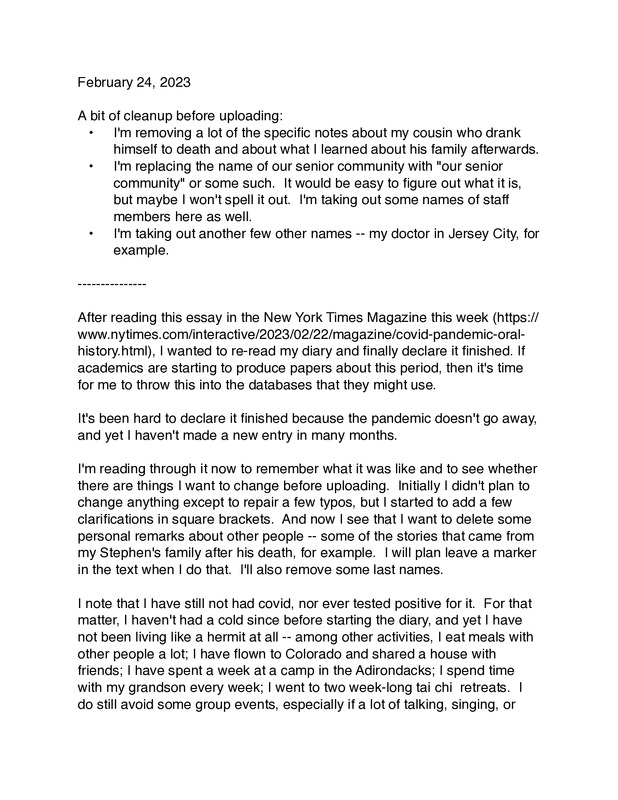 2020-02-25
2020-02-25Covid journal, 2020-2023
From the beginning, I was aware that this was a world historical event and I wanted to be very attentive to how it played out, both in the news and in my personal life. I read that diaries were scarce in the aftermath of the 1917 pandemic, so it could be useful to scholars to create one this time. I reviewed it before submission, and it reminded me of many things I had already forgotten. Once I started in February 2020, I wrote every day until mid-2021, when entries began to thin out. -
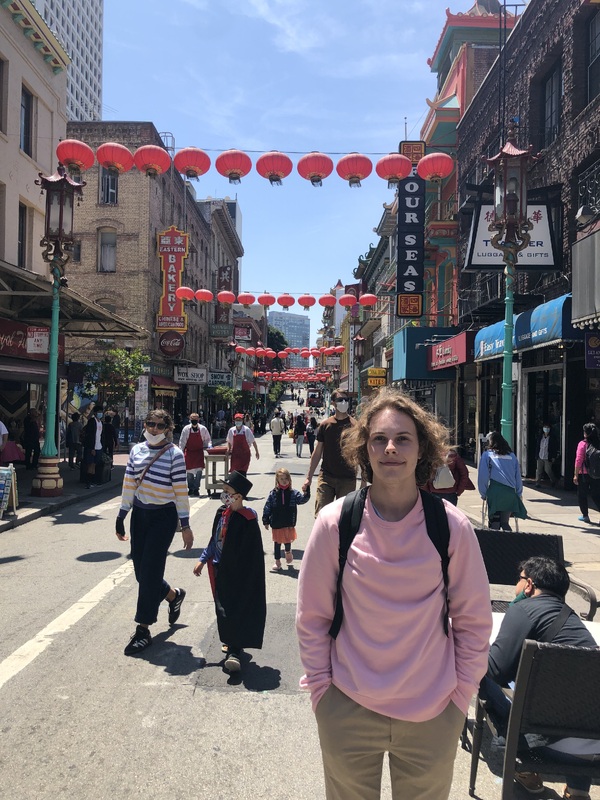 2021-07
2021-07Trip to San Francisco July 2021
During the summer of 2021, my girlfriend and I traveled to San Francisco for a week-long vacation. Travel and business restrictions were greatly lessened but still in place. As seen in the photo masks were still very common, especially in a big city like San Francisco where there was less anti-mask sentiment (my mask was off just for the photo). We wore masks for the majority of the trip, including while on planes and trains or in any public space. One of the bigger impacts of the pandemic that we experienced during our trip was how many restaurants and other businesses closed at earlier times than before. Additionally, while our trip was happening the 2020 Tokyo Olympics were finally occurring after all of the delays to its start. We were able to watch many events from our hotel room that would have otherwise occurred a year prior. -
2022-06-01
Covid Europe
My family and I really like to travel, like a lot. We usually do a big vacation every year, and Covid-19 really threw a wrench in our annual plans (as it did to every single person alive). March of 2020, my family and I had traveled to Washington D.C. When we got back home to Utah, not even 24 hours later, Washington D.C. had shut down entirely. We felt lucky we got to go, but hopeful this shut down would only be two weeks. Fast forward two years, and we (again, like the rest of the world) were unable to go anywhere. My sister and I had gotten Covid-19 in November of 2020, and then the vaccines started to roll out. We had heard that if you were fully vaccinated, places were starting to slowly open for those individuals. We thought since we already had Covid-19, why not get vaccinated so we could travel? So, my mom, myself, and my sister all got vaccinated. Solely to travel. We are by no means 'anti-vaccination' people, actually quite the opposite. But we did have the normal hesitations of getting this vaccine just to such little prior research. Regardless, we got the vaccine. We started looking at places where we could go, from cruises to domestic travel to international. And then, the booster comes out. The rules are now that you have to have all three shots. And then, I get Covid-19 again in November of 2021, after having been fully vaccinated. Finally, we start to plan a Europe trip for the summer of 2022. Every plane, train, and automobile that would take us to and around Europe required a valid Covid-19 vaccination card. There were so many Covid-19 tests we had to take prior to departure from the US, then when we got to Europe, and then when we were getting ready to return home to the US. We had to fill out numerous forms verifying that we were not sick and had not been sick in the previous 14 days. While we were in Europe, the mask mandate had lifted for everywhere but Austria, but we didn't know that. We went to board an Austrian airlines flight without a mask, and we were then told we could not fly without a mask. We had to beg the flight attendant to give us one, as we didn't know (they were not nice about it). Keeping up with everyone's different rules and regulations and testing and forms definitely made our trip more difficult than it would be now. -
2022-06-15
Preventing the Inevitable
When travel restrictions were lifted, my family and I did not travel right away. We waited about a year until we felt it was safer to travel. When that year arrived, we decided to take a pre-pandemic planned trip that was canceled due to Covid. We traveled to Cancun, Playa del Carmen, Chi Chen Itza, and Xcaret in Mexico. As you can see, we were anxious to travel the world. The main reason we decided to go to Mexico as our first trip during Covid was that it was economical for a family of ten. Additionally, Mexico was very lenient with Covid restrictions which made it easier for us to travel One of the most memorable memories was to have watched my kids have so much fun while learning and visiting a country they had never been. As for myself as a History teacher, one of the experiences I will never forget was visiting Chi Chen Itza as I was able to see History with my own eyes and learn more about the locals, community, and culture. With all these great memories that I had as much as we protected ourselves by wearing masks, maintaining social distancing, using hand sanitizer at all times, and all of us fully vaccinated. Half of the family ended up testing positive for Covid while in Mexico. The one thing we were avoiding the most ended up happening during our first trip since Covid began. While Mexico did not have restrictions to enter their country for tourism, the United States at that moment had a policy that all returning travelers must have a negative Covid test prior to boarding the plane. two days prior to our departure the restriction was lifted, and my family was able to return back to the US without having to wait out in Mexico and extend the trip. Since the family was so conscious of Covid we made sure we had KN95 masks at all times, did not share items, and reduced the amount of contact in order to not spread the virus which is what helped half of the family not get it. Overall, this was a trip that we will never forget. We had a blast and would love to visit the country another time. We would continue to be safe while traveling even if there are no restrictions. Covid has really changed how I live my life, especially during travel. What I have submitted is important to me because it will become a record in history in sharing my personal experience during the pandemic. It is also important to me to demonstrate that this area in Mexico is heavily dependent on tourism. While I was there, I met people from countries that had a lot of travel restrictions, and due to Mexico having almost none, it was a very popular traveling destination. -
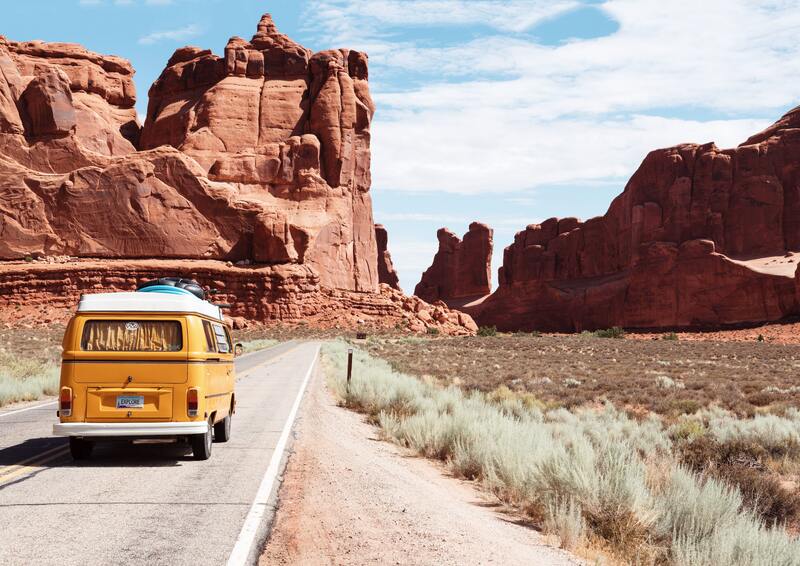 2023-02
2023-02Tourism story for the COVID-19 Archive
Worldwide, nations implemented social distancing and disease mitigation strategies in the Spring of 2020. These policies varied widely, but many places experienced restrictions on personal movement and travel. For your submission, respond to the following prompt: When travel restrictions were lifted, did you take a trip? If so, where did you go and why? What are your memories of this trip? Were there any continuing COVID-19 restrictions in place? If you did not travel and have still not traveled, answer the following question: If you could travel anywhere, where would you go and why? What destinations would you be sure to see? How would you document your trip (journal, social media, etc.)? How and What to Submit: For this assignment, you'll submit one item that captures a travel memory that relates to the COVID-19 pandemic. You'll submit your item to the COVID-19 Archive Links to an external site.on the "Share your Story Page." Include the following metadata (information): The title The description (this is the most important part. Tags: at a minimum (Arizona State University, HST 643, and History of Tourism). Feel free to add your own additional tags. Type: Audio recording, photograph, video, text story, recipe, etc. Date (When did this story happen) Contributor (your name) Location (where did/does this memory take place). What to submit: Submit your story to the archive Submit the title of your story on Canvas and the date you submitted it. This will help me find it in the archive. -
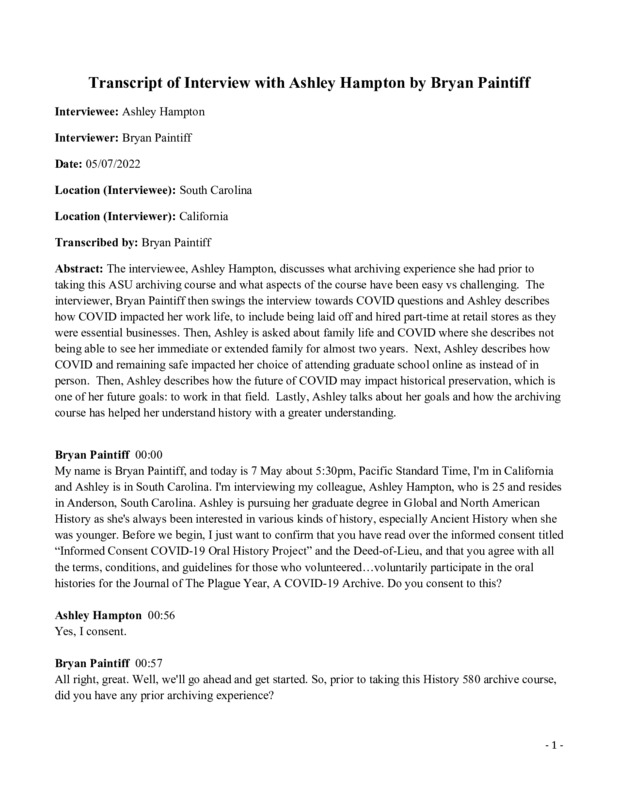 2022-05-07
2022-05-07Ashley Hampton Oral History, 2022/05/07
An ASU graduate student reflects on her career, school, and life throughout the COVID-19 pandemic and its aftermath. -
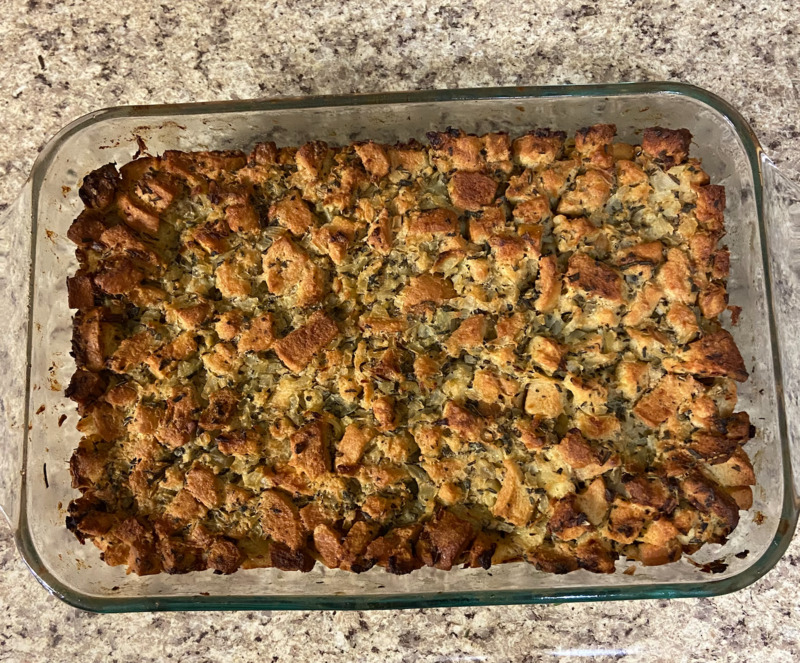 2020-11-26
2020-11-26Thanksgiving 2020
This was the homemade stuffing I made for Thanksgiving of 2020. Due to social distancing my family had in order to protect people, my extended family ate at two separate locations. For me, that meant going to my parent's place next door and dining with my aunt and uncle. My grandparents had their own celebration with other family members. One interesting twist to this was that we all ended up eating the same food between both houses because it was split up. This is why I ended up making a lot more stuffing than I normally would for Thanksgiving. In addition to this, I brought over some homemade cranberry sauce and homemade jam. I had learned to make canned jam during 2020, and I had some leftover to give. Everyone enjoyed the food I made and my aunt said it was some of the best stuffing she ever tasted, and she isn't really a big fan of stuffing. Sadly, the stuffing was not enough to ease tensions on the politics happening at the time. Other parts of the day included my family getting into a political discussion on the 2020 election. I had different views on it than my family did, so I left once that started. Later on in the evening, me and my husband went over to my in-laws. My sister-in-law was sick with COVID, so my father-in-law gave her food from the evening for her to take home. I was bummed about that, but people did not want to take their chances of getting others sick, which I understood. My father-in-law invited someone that year from Egypt for the occasion. It also turned into a political discussion there. I felt more comfortable voicing my opinions there than I did with my immediate family, but it was still draining. It made an otherwise okay evening into something that I don't want to think about. 2020 was a hard year for many people, and the election being so close to Thanksgiving made it very awkward. It has toned down since then, but I think people being locked down and exposed to constant social media and news coverage made it harder for people to actually discuss things. I think it's a good thing to be informed, but I do not believe the information overload many dealt with during 2020 was healthy. It even took a toll on me, as it made my mental health worse. Between the lockdowns, protests, and election, it was hard for me to take all at once. My only real solace was school and my husband, as both forced me to think of things not happening at the very moment. As a history major, I find it easier to think of events in the past than I do the present at times. It's why I really like the medieval period in Europe because it is far enough removed from the current era, so I am less likely to get heated about some of the topics brought up. With current events, I need to take a break at times. It was very obvious that the Thanksgiving from 2020 was not something that really made my mental health better. I enjoyed the food and the company, but I had a hard time wanting to discuss politics with people that I interact with regularly. It's one thing to discuss with strangers I might never see again, but completely another to talk about it with people that you need to interact with daily. Now that things are back to normal, for the most part, the tensions are not as high. I find myself being able to discuss politics again with some family members without it going badly. Overall, I would say that Thanksgiving 2020 was a good social experiment on how much overexposure to media and lockdowns can be detrimental to personal relationships. Seeing things behind a screen too often and being away from others takes a toll on humanity. This is why I was so glad when things started opening up again because people need to be out more and with others. As much as technology has helped us communicate, it still can't make up for the human interaction everyone needs. My own mental health has been much better since the ending of the restrictions and I don't want to go back to them again. -
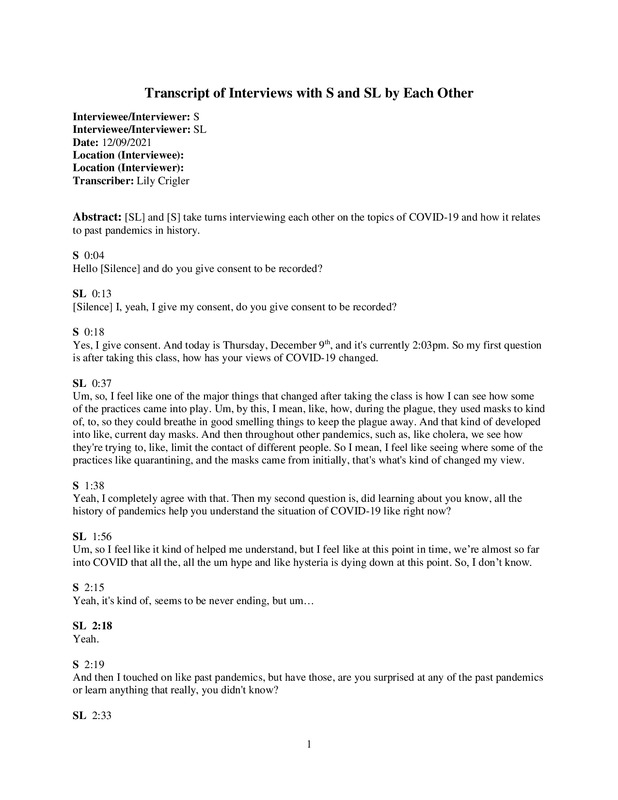 12/09/2021
12/09/2021SL and S Oral History, 2021/12/09
[SL] and [S] (Last name unknown) take turns interviewing each other on the topics of covid-19 and how it relates to past pandemics in history. -
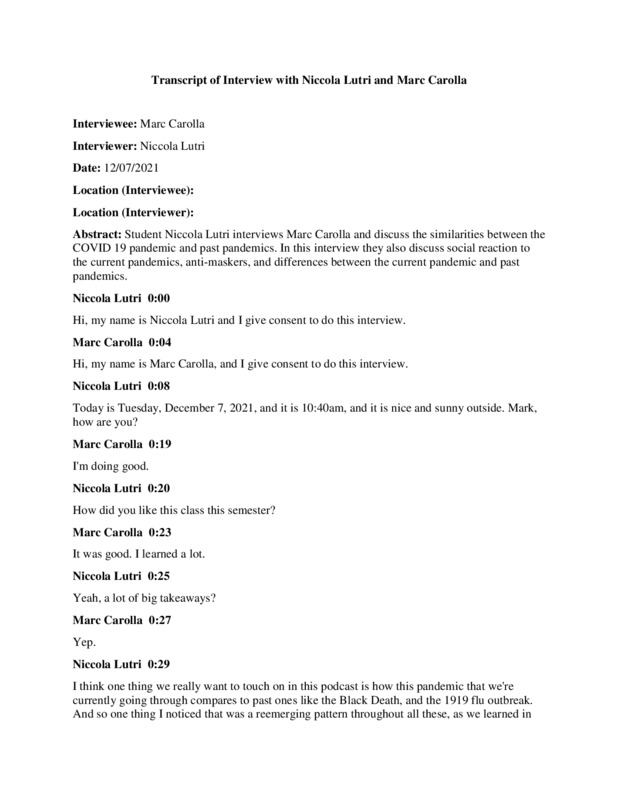 2021-12-07
2021-12-07Marc Carolla and Niccola Lutri Oral History, 2021/12/07
Marc & Niccola discuss their experiences with COVID-19 and relate it to past pandemics that they learned about in class -
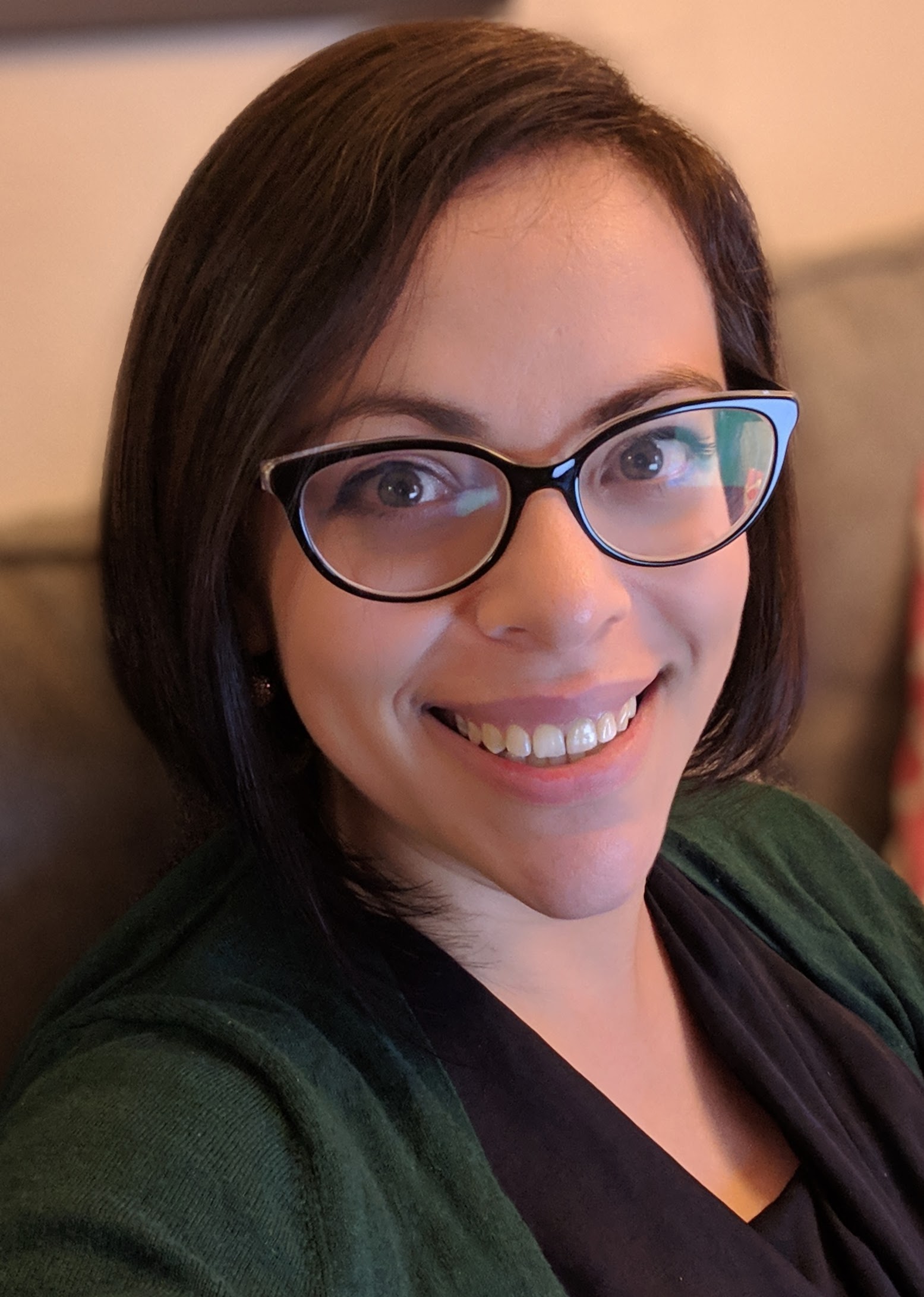 2021-11-09
2021-11-09Professor Perspective on University Changes
Dr. Sara Ronis, a theology professor at St. Mary’s University, gives us a faculty perspective on how she believes the university handled the COVID-19 pandemic. She feels that despite being in such difficult positions, the university made the decisions they knew would be best for the St. Mary’s community. As a professor, she immediately thought of her students when COVID cases began to rise and the possibility of being sent home became an even more real possibility. She admires how St. Mary’s students, new and returning, have adapted to these new learning environments. -
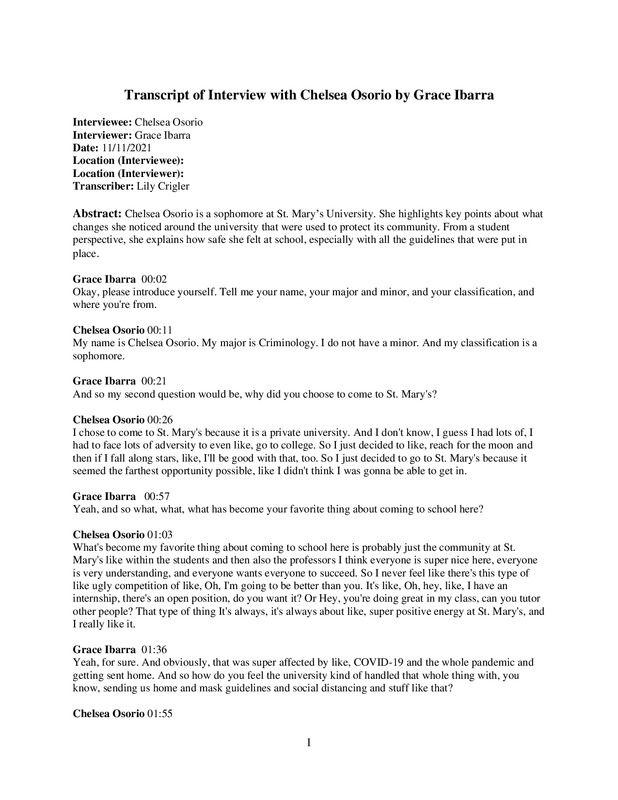 2021-11-11
2021-11-11Commuter Student Perspective on University Changes
Chelsea Osorio is a commuter student at St. Mary’s University and among the many personally affected by the COVID-19 pandemic. In her interview she highlights key points about what changes she noticed around the university that were used to protect our community. From a student perspective, she explains how safe she felt at school, especially with all the guidelines that were put in place. This goes to show how St. Mary’s students, faculty, and staff were committed to ensuring not only a healthy online environment but also making sure we returned to a safe and healthy community. -
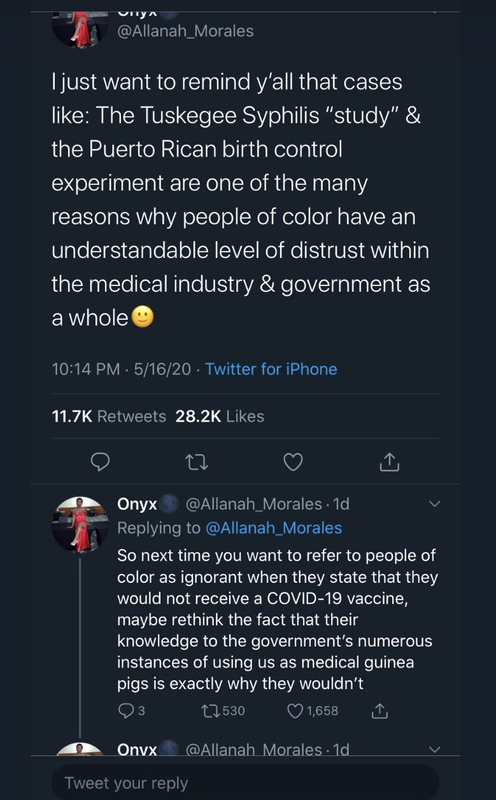 2021-05-16
2021-05-16Vaccine Hesitancy in the Black Community
This tweet reflects an ongoing controversy of the Covid-19 vaccine. The media has reported a hesitancy of the mRNA vaccine amongst the black community, but with little to no context on why there is such hesitancy. Based on the history of the U.S. public health institution, there have been reported inequalities that include a racial hierarchy within the medical system. This tweet specifies the instances of medical malpractice committed towards people of color and insists on an understanding of racial inequality through the lens of people of color that led to skeptical feelings about the vaccine. -
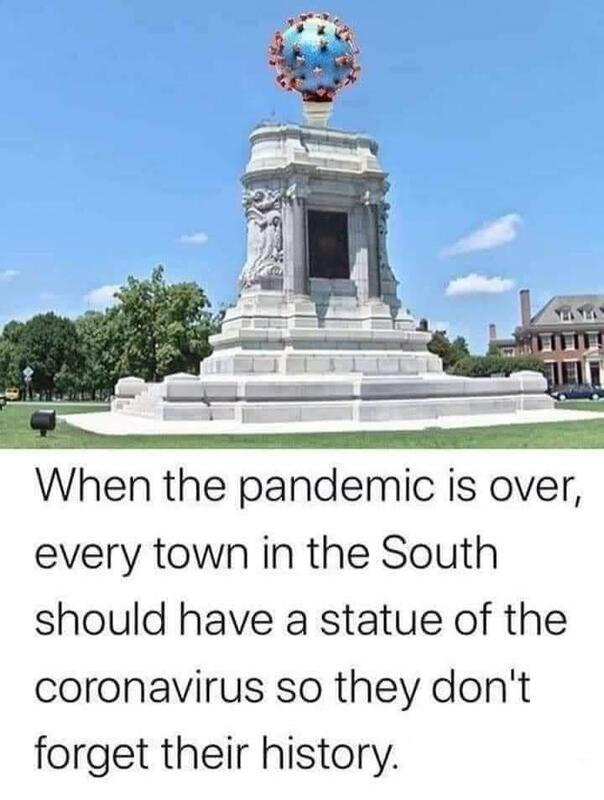 2021-08-07
2021-08-07COVID Monument
This meme seemed relevant as it ties into the argument being pushed that removing confederate statues erase history, but monuments are not history. Rather a reflection of that time and space according to who paid for the monument. -
2021-04
Teleworking: Good and Bad
I started a job earlier this year that is entirely remote. Before COVID-19, I would never have considered a remote job/ the possibility of teleworking simply because I thought it was something that wouldn't be possible in the field of History. Obviously this all changed when things shut down in 2020- and in some ways, the work realm changed for the better. I was able to secure a remote job relevant to my field for good pay, something that would not have been possible before the pandemic. On the other hand, working entirely remote makes it much harder to connect with coworkers and get out of the house. -
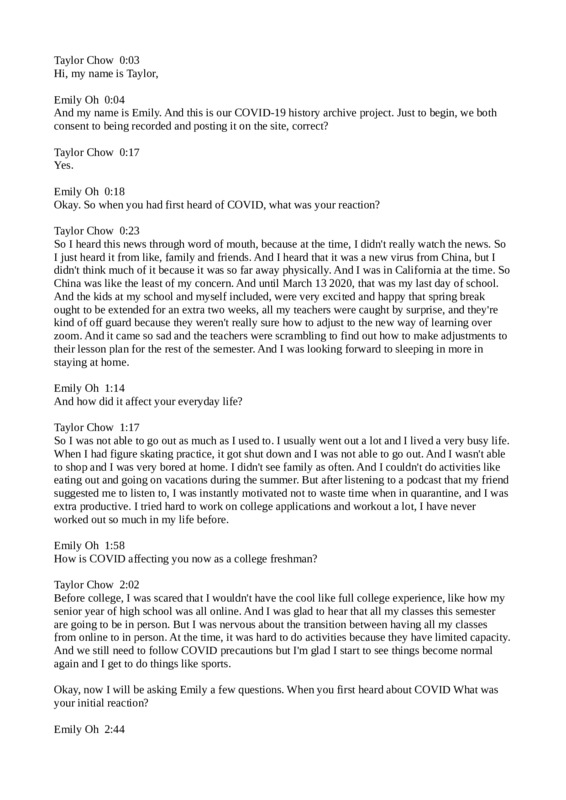 2021-09-24
2021-09-24COVID-19 Archive Project
Two students interview each other about the pandemic and how it affected their life. -
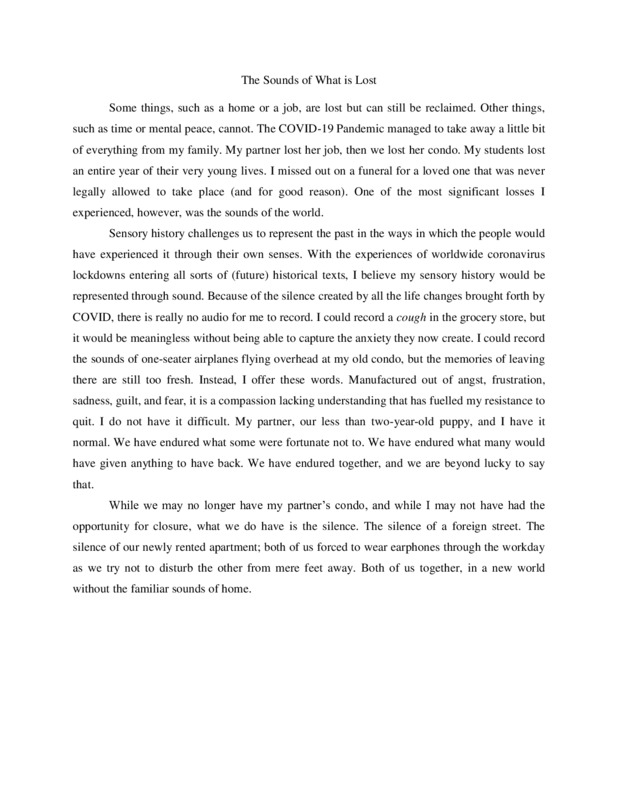 2020-09-30
2020-09-30The Sounds of What is Lost
This story speaks to the ever-changing sounds of the pandemic. Sensory history allows us to engage with the past in ways the invite the senses of the past back into the story. As my partner and I were navigating all the trials and tribulations conjured into existence by the events of the past year and a half, we noticed how silent our home full of sadness and confusion had been. Gone were the overhead aerial shows, the chatty neighbors, the rattling railway tracks... Now there was nothing. Our sense of sound changed dramatically and began to represent how fractured our connection to the world was. We had to be plugged in to tune each other out. We had to stare at a screen to see a familiar face. While most things felt, looked, and smelled different, there was nothing that sounded the same. -
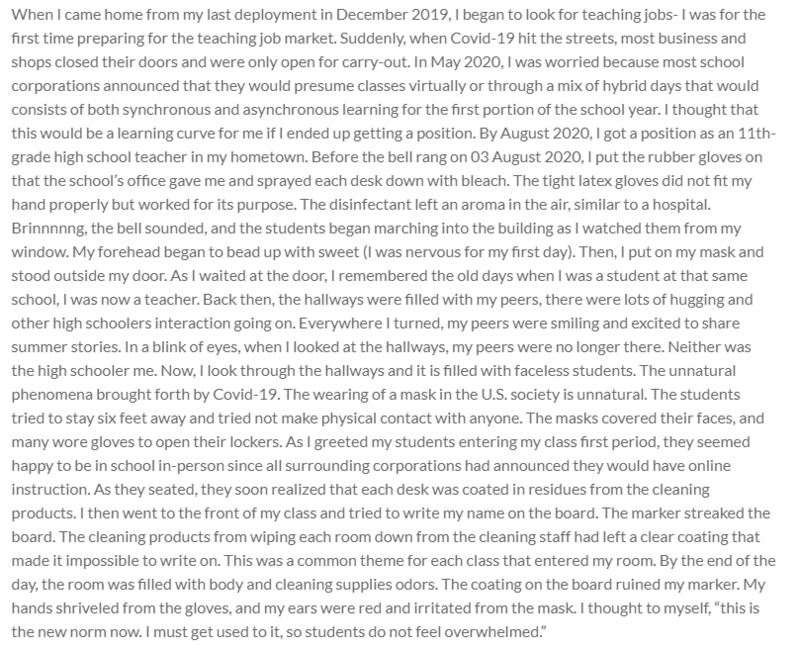 2020-08-04
2020-08-04U.S. History Classroom
When I came home from my last deployment in December 2019, I began to look for teaching jobs- I was for the first time preparing for the teaching job market. Suddenly, when Covid-19 hit the streets, most business and shops closed their doors and were only open for carry-out. In May 2020, I was worried because most school corporations announced that they would presume classes virtually or through a mix of hybrid days that would consists of both synchronous and asynchronous learning for the first portion of the school year. I thought that this would be a learning curve for me if I ended up getting a position. By August 2020, I got a position as an 11th-grade high school teacher in my hometown. Before the bell rang on 03 August 2020, I put the rubber gloves on that the school’s office gave me and sprayed each desk down with bleach. The tight latex gloves did not fit my hand properly but worked for its purpose. The disinfectant left an aroma in the air, similar to a hospital. Brinnnnng, the bell sounded, and the students began marching into the building as I watched them from my window. My forehead began to bead up with sweet (I was nervous for my first day). Then, I put on my mask and stood outside my door. As I waited at the door, I remembered the old days when I was a student at that same school, I was now a teacher. Back then, the hallways were filled with my peers, there were lots of hugging and other high schoolers interaction going on. Everywhere I turned, my peers were smiling and excited to share summer stories. In a blink of eyes, when I looked at the hallways, my peers were no longer there. Neither was the high schooler me. Now, I look through the hallways and it is filled with faceless students. The unnatural phenomena brought forth by Covid-19. The wearing of a mask in the U.S. society is unnatural. The students tried to stay six feet away and tried not make physical contact with anyone. The masks covered their faces, and many wore gloves to open their lockers. As I greeted my students entering my class first period, they seemed happy to be in school in-person since all surrounding corporations had announced they would have online instruction. As they seated, they soon realized that each desk was coated in residues from the cleaning products. I then went to the front of my class and tried to write my name on the board. The marker streaked the board. The cleaning products from wiping each room down from the cleaning staff had left a clear coating that made it impossible to write on. This was a common theme for each class that entered my room. By the end of the day, the room was filled with body and cleaning supplies odors. The coating on the board ruined my marker. My hands shriveled from the gloves, and my ears were red and irritated from the mask. I thought to myself, “this is the new norm now. I must get used to it, so students do not feel overwhelmed.” -
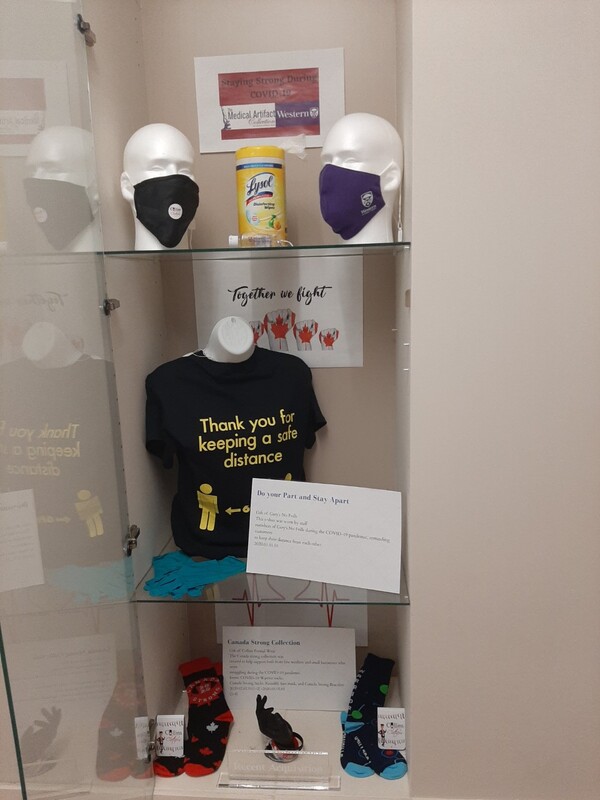 2020-09-30
2020-09-30"Staying Strong During COVID-19" New Acquisitions Exhibit
This exhibit was installed by the Medical Artifact Collection at Western University. It features several COVID-19 related artifacts that were recently donated to the collection in 2020. The exhibit was curated and installed by the collection's research assistant Kat Bezaire. -
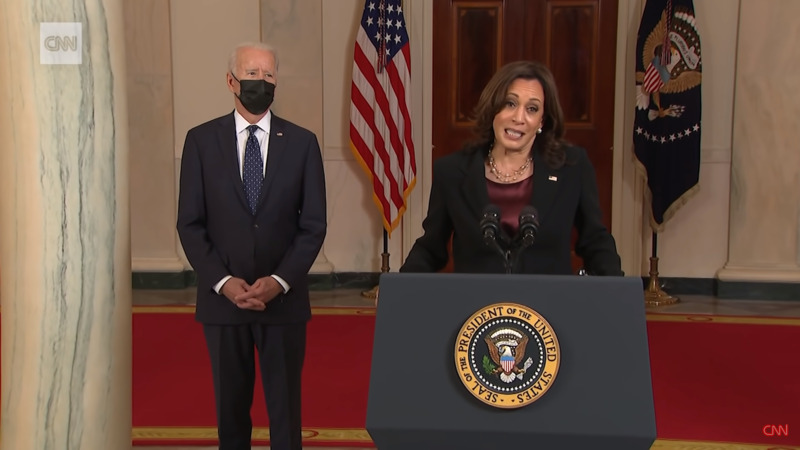 2021-04-20
2021-04-20Biden and Harris speak after Chauvin verdict
President Joe Biden and Vice President Kamala Harris speak after a jury found Derek Chauvin guilty of all charges in the murder of George Floyd. "A Measure of Justice is not the same as Equal Justice" President Biden and Madam Vice President Harris talk about social justice, racism, history, and plans moving forward. -
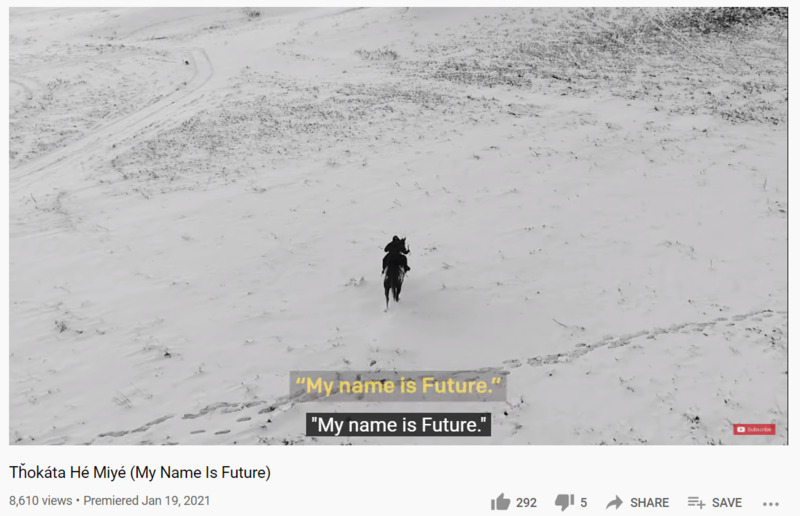 2021-01-19
2021-01-19Tȟokáta Hé Miyé (My Name Is Future)
A film by the Standing Rock Sioux Tribe and Earthjustice Written and Directed by Josué Rivas Narrated by Grace DeRockbrain Cinematography by: Josué Rivas, Adam Johansson. Drone2Bwild, Digital Smoke Signals, Akicita Film Edited by Dylan Sylwester Audio by Natalie Huizenga Community Outreach and Recording: Sunshine Woman Grace DeRockbrain (Standing Rock Sioux Tribe) Teena Pugliese and AnnaLee Yellow Hammer Translation: Doug Goodfeather Co-Producers: Rebecca Bowe and Chris Jordan-Bloch for Earthjustice -
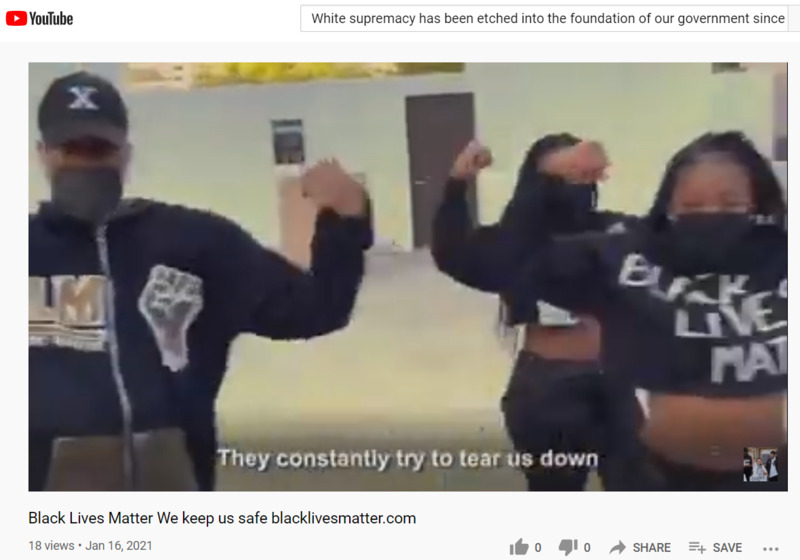 2021-03-30
2021-03-30White supremacy has been etched into the foundation of our government
Video shows past and present Social Justice movements to fight white supremacy, including current movements taken place during the pandemic. From the Video: White supremacy has been etched into the foundation of our government since the beginning. We don't rely on governments to do the work of mass movements. We don’t rely on the same tactics as white supremacists. This week, we will NOT give them what they want, which is a reaction out in the streets. Today and everyday, WE keep us safe. WE will end white supremacy. Check in on each other. Join us: blacklivesmatter.com -
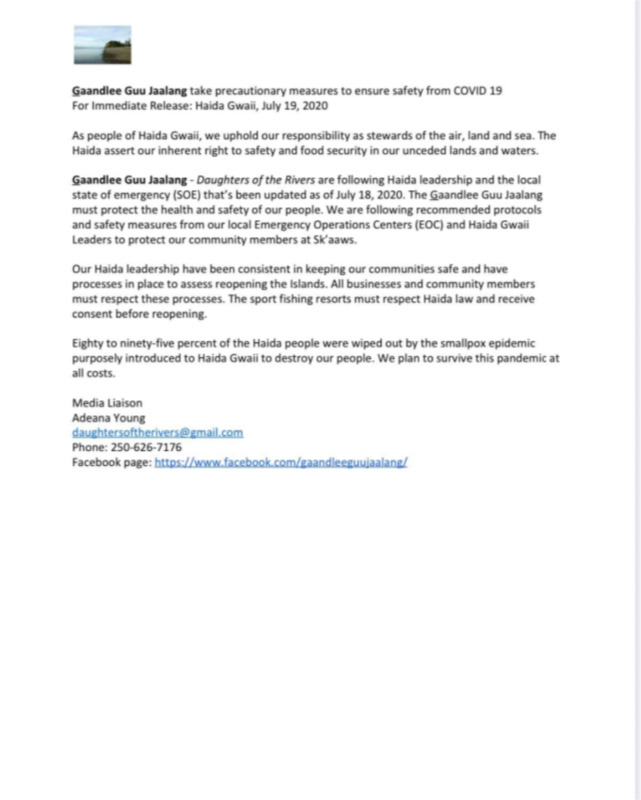 2020-07-20
2020-07-20G̱aandlee Guu Jaalang take precautionary measures to ensure safety from COVID 19
G̱aandlee Guu Jaalang take precautionary measures to ensure safety from COVID 19. -
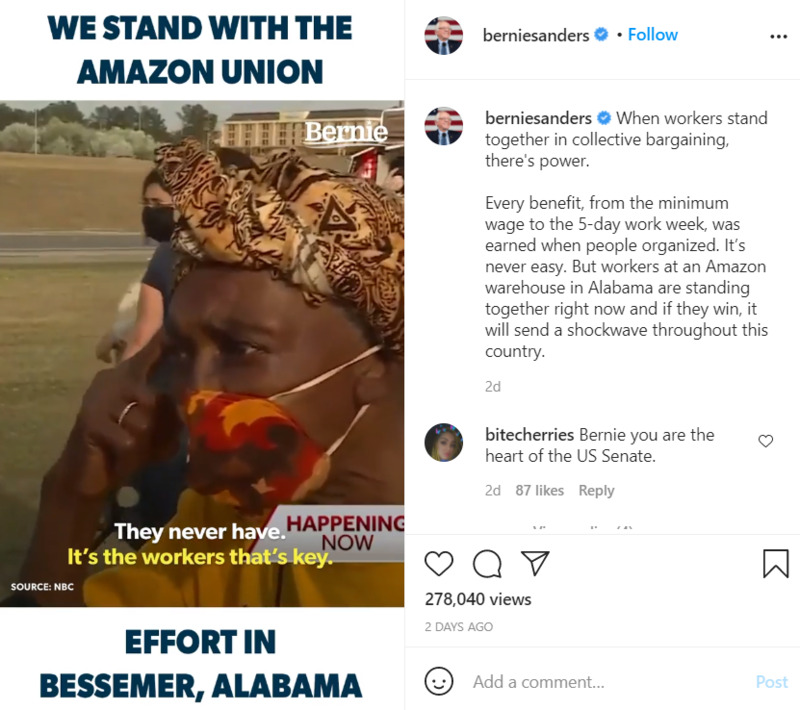 2021-03-21
2021-03-21When Workers Stand Together in Collecive Bargaining, There's Power.
Verified When workers stand together in collective bargaining, there's power. Every benefit, from the minimum wage to the 5-day work week, was earned when people organized. It’s never easy. But workers at an Amazon warehouse in Alabama are standing together right now and if they win, it will send a shockwave throughout this country. -
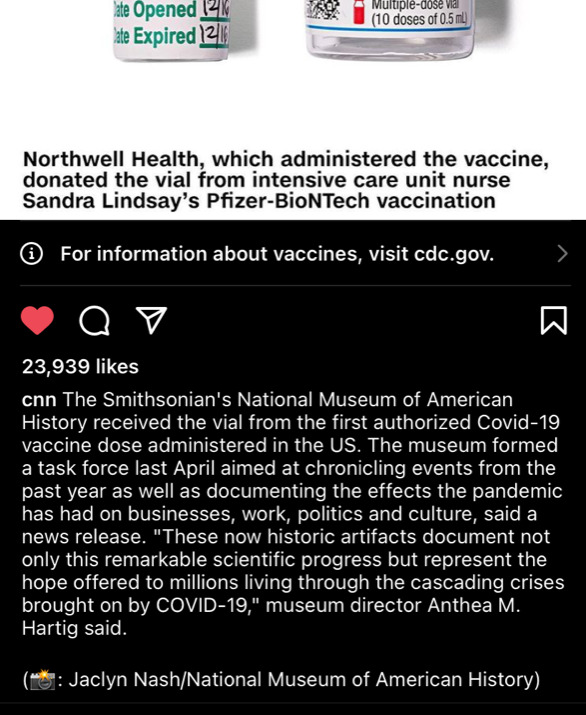 2021-03-13
2021-03-13Smithsonian receives vial from the first Covid-19 vaccine does administered in the US
"The Smithsonian's National Museum of American History received the vial from the first authorized Covid-19 vaccine does administered in the US. The museum formed a task force last April aimed at chronicling events from the past year as well as documenting the effects of the pandemic has had on businesses, work, politics, and culture, said a news release. "These now historic artifacts document not only this remarkable scientific progress but represent the hope offered to millions living through the cascading crises brought on by COVID-19," museum director Anthea M. Hartig said." -
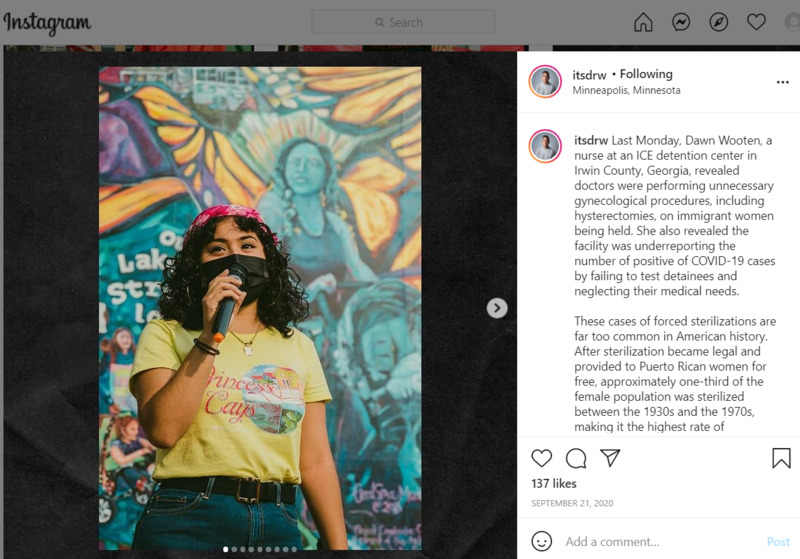 2020-09-21
2020-09-21Protests against ICE, Forced Sterilization and Under Reporting of Covid-19 Cases in Detention Centers
Last Monday, Dawn Wooten, a nurse at an ICE detention center in Irwin County, Georgia, revealed doctors were performing unnecessary gynecological procedures, including hysterectomies, on immigrant women being held. She also revealed the facility was underreporting the number of positive of COVID-19 cases by failing to test detainees and neglecting their medical needs. These cases of forced sterilizations are far too common in American history. After sterilization became legal and provided to Puerto Rican women for free, approximately one-third of the female population was sterilized between the 1930s and the 1970s, making it the highest rate of sterilization in the world. Health workers encouraged the procedure through door-to-door visits and employers showed favoritism towards sterilized women. I highly recommend a short documentary called La Operación available online about this US-imposed sterilization policy in Puerto Rico. -
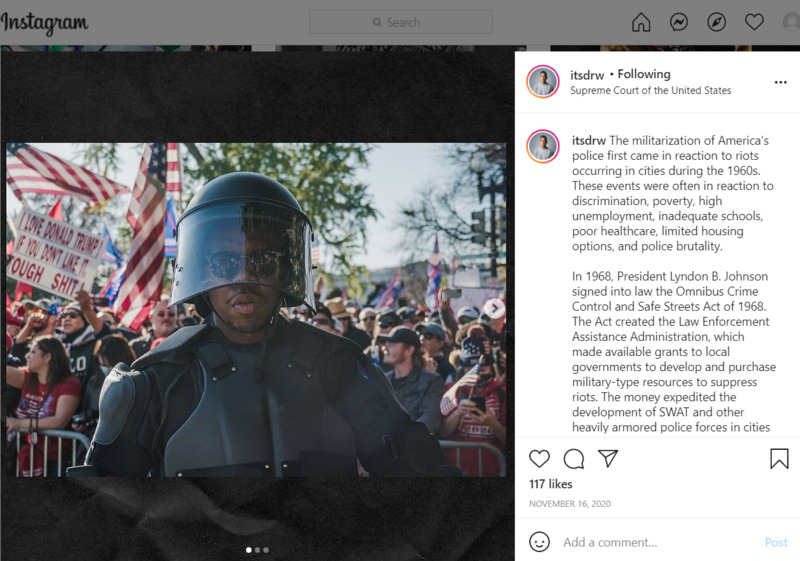 2020-11-16
2020-11-16Militarization of Police
The militarization of America's police first came in reaction to riots occurring in cities during the 1960s. These events were often in reaction to discrimination, poverty, high unemployment, inadequate schools, poor healthcare, limited housing options, and police brutality. In 1968, President Lyndon B. Johnson signed into law the Omnibus Crime Control and Safe Streets Act of 1968. The Act created the Law Enforcement Assistance Administration, which made available grants to local governments to develop and purchase military-type resources to suppress riots. The money expedited the development of SWAT and other heavily armored police forces in cities to counteract uprisings. -
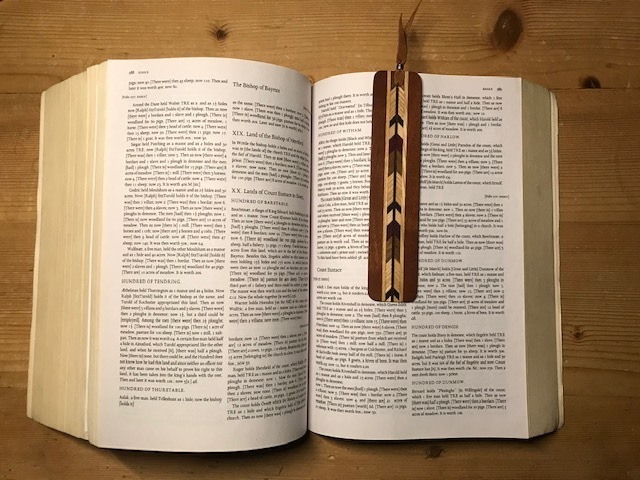 2020-04
2020-04The Historical Research Project
Specifically, the Covid-19 pandemic inadvertently prevented me from my continued work in the Research Department at the Denver Public Library, as well as my volunteer work with the School Tours program at the History Colorado Center. However, it has given me an opportunity to conduct a history research project of my own choosing. I have had an ongoing interest in a writing project on the Domesday Book, which was a survey conducted in medieval England in AD 1085-1088. The repeated news stories on fellow Americans and citizens from around the world choosing to become interested in artwork and/or other projects while presented with an abundance of personal time due to Covid-19 restrictions has inspired me to begin this project. I was able to obtain a copy of an English translation of the Domesday Book and, though my graduate level academic work has not been postponed in any way, I have found time to begin this work. I will always remember that I began this passionate project because of the Covid-19 lockdown and restrictions, it will occupy my time far beyond Covid-19. -
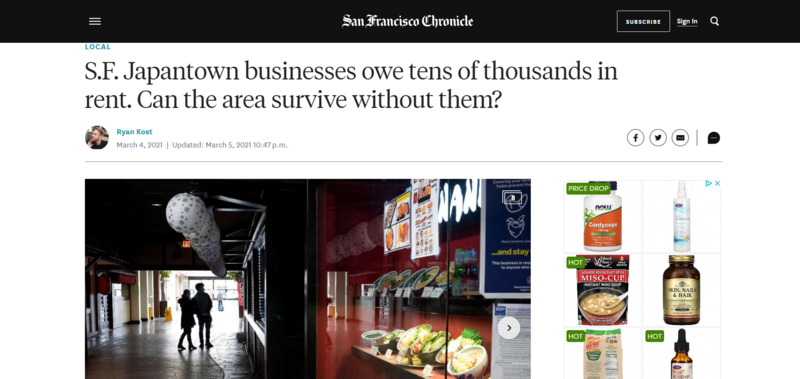 2021-03-04
2021-03-04S.F. Japantown businesses owe tens of thousands in rent. Can the area survive without them?
In the decades since, the community’s boundaries have shifted and shrunk, devastated by forced Japanese removal and internment in the 1940s and by large-scale redevelopment in the ’70s. But San Francisco’s Japantown persisted, even as others throughout the United States faded away. Today, Nihonmachi is the country’s oldest and largest Japantown, one of three remaining, but it covers only about six blocks — and many worry it is in danger of disappearing. The pandemic has hit neighborhood businesses particularly hard, and this year an agreement with the area’s largest landowner to keep the Japan Center malls “Japanese-themed” is set to expire. -
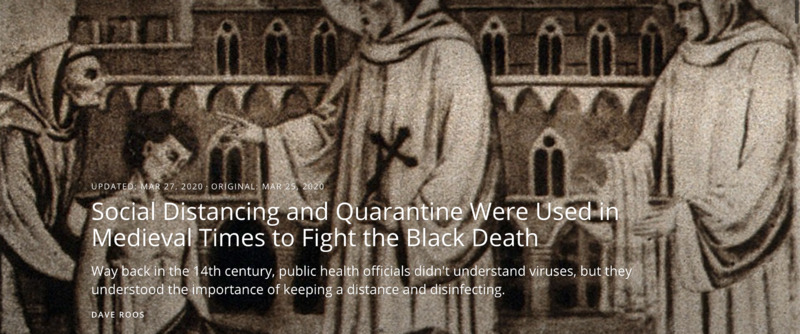 2020-03-27
2020-03-27Social Distancing and Quarantine Were Used in Medieval Times to Fight the Black Death
A medieval Italian legislation document, dating from 1377, reveals that social distancing and quarantine measures were practiced during the bubonic plague. The article describes what measures seaport towns took to screen and isolate ships before their goods and crews could enter these populations Also, it discusses the advent of plague hospitals, how the word quarantine came to be, and 14th century public health structure. As far as medicine and technology has advanced over the centuries, we are still using some of the same practices that were used seven centuries ago. It illustrates how much we can still learn from the past. -
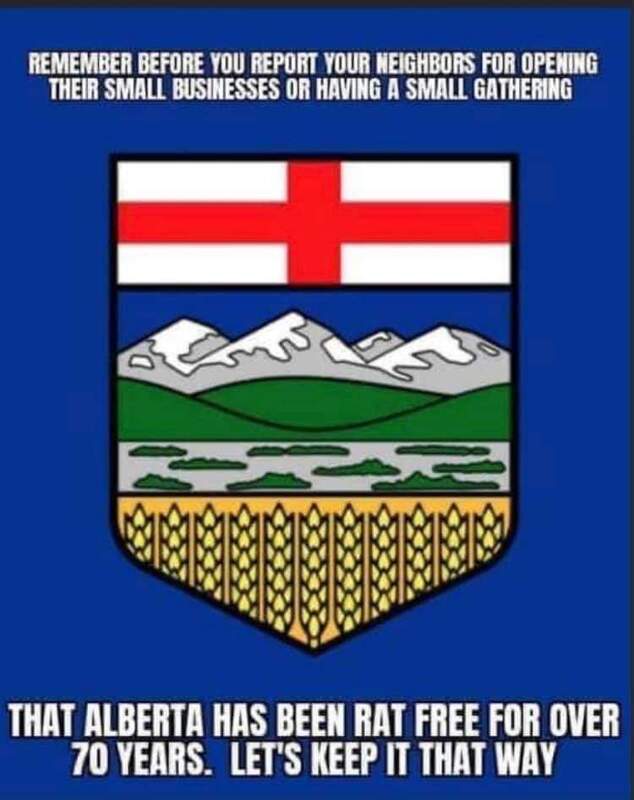 2021-01-29
2021-01-29Keeping Alberta Rat Free
Alberta has been historically known for two things, number one being the oil and gas industry, the second being Alberta’s lack of rats. Alberta historically prides itself on being a ‘rat free’ province through extermination campaigns throughout the whole province in order to maintain the mantle; and to protect Alberta’s agricultural sectors. Because of this legacy, Albertan pandemic skeptics on my home town’s Facebook page posted this meme in reference to people reporting large gatherings, and businesses which violate quarantine restrictions. Underneath this photo, many people who thought alike had a good chuckle and patted themselves on the back for keeping Alberta ‘rat free.’ However, these pandemic skeptics forget that Alberta became ‘rat free’ by people reporting sightings of rats, using the local 310-RATS hotline which alerted exterminators to the presence of rats throughout the province. This item matters to me in that it is how pandemic skeptics impose falsified history, and possibly Albertan nationalism to justify their own behaviour as somehow patriotic. I know I’m reading into this too deeply, but I find it somewhat funny how ignorant these people are to the true reality of our ‘rat free’ title, that we achieved it by reporting sightings of rats which posed a danger to our entire province; just how these people are posing a threat to the health of our entire province by opening businesses and getting together in large groups. This is mainly supposed to serve as a window into the Albertan experience of the Pandemic, with specific interest to the anti-masker’s opinions and thoughts on social media. I want to similarly point out, that I wasn’t the only person who noticed that Alberta was made ‘rat free’ by ratting on rats in this photo’s comment section. -
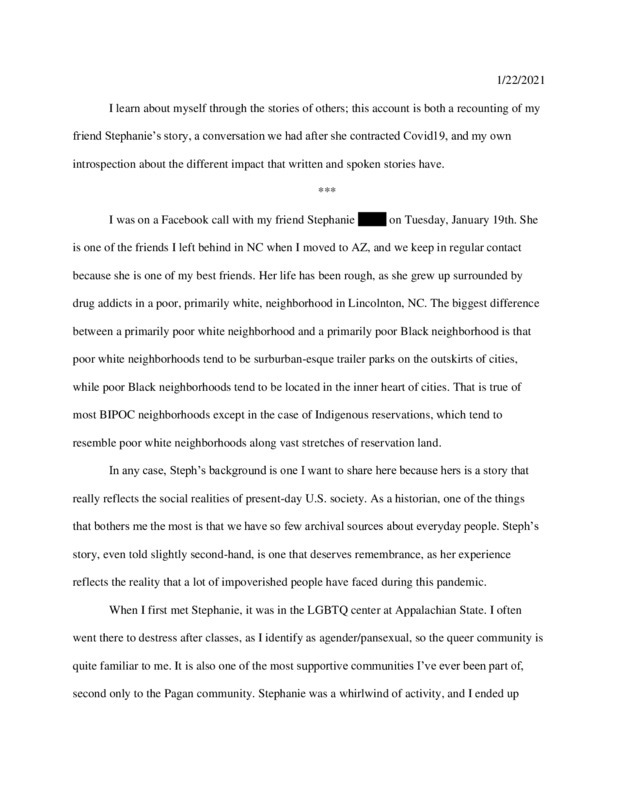 2021-01-22
2021-01-22A Covid Experience
I learn about myself through the stories of others; this account is both a recounting of my friend Stephanie’s story, a conversation we had after she contracted Covid19, and my own introspection about the different impact that written and spoken stories have. -
2021-01-22
The Silver Lining of Pandemic Community Building
I have a busier schedule now than I did when I left the house for more than grocery runs and work. I spend a lot of my time on Zoom, as we all do, but doing things I was not doing before. In April, quickly after Friday the 13th, my #twitterstorian dreams came true when Dr. Joanne Freeman launched History Matters…. And So Does Coffee with the National Council for History Education. A couple of months later, The Gilder Lehrman Institute launched a weekly series talking with a historian about their book called Book Breaks. I could never attend conferences like the Southern Historical Association annual meeting, and now they were available to me virtually. The Western History Association annual meeting was online in October 2020 and was one of the best conferences and online meeting experiences that I think is possible given the circumstances. I have seen Joanne Freeman and Dr. Heather Cox Richardson speak together frequently over the last few months, and each experience is just as fun as the previous. I am on the board of the Arizona Technology in Education Association. The ability to host events and PD without needing to secure locations and catering has increased the number of events that we host by what feels like tenfold. I also started my Ph.D. in history at ASU, and with those added time blocks to my schedule expanded my little world with cohort and classmates. The pandemic has forced us to come together in new ways. By trying to carry on, those components of our lives shifted to the internet and thus actually made them more accessible to our larger communities than they were before. It has prompted even more of the existing conversations about virtual conferencing from an economic and environmental perspective. Don’t get me wrong, I am eagerly awaiting my 2nd vaccine and the days when I can travel for conferencing, community, and research again, but I think I will frame my plans around a different question. I don’t believe that I will have to ask myself to choose what to attend and not attend. Instead, it will be what things do I want to engage with in person (and what things can I) and what things I will still attend, but from afar. We are closing in on a year in this pandemic, and with the new year, I think it is essential to try and find some kind of silver lining – and it is that I think the communities that we have built over the last year and continue to build will be larger and stronger. Now I suppose I need to mull over the ramifications of overscheduling, burnout, and prioritization. -
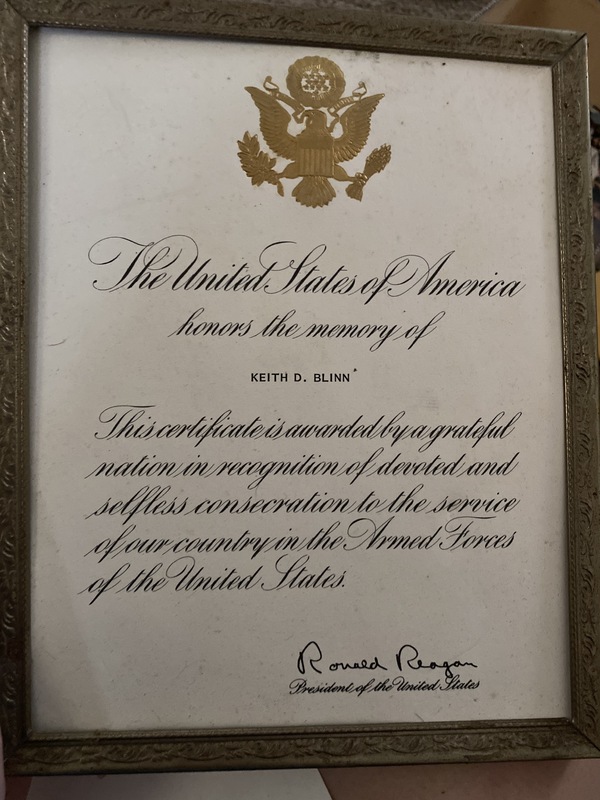 2020-10
2020-10Family Inheritance
My grandmother passed in July 2020, a few months after the Covid-19 pandemic began in the United States. She left behind a lot of miscellaneous things, including a number of family heirlooms that I have inherited. When we were packing up her trailer and storage containers, we had totes upon totes filled with family documents, awards, newspaper clippings, objects, and photographs. I feel as if I have my own personal archive of our family within these totes. I can't help being emotional about these things I now possess and grateful that my grandmother was a family-history hoarder. I can carry her memory on by taking care of them. One of the various objects was this letter/certificate in a frame, giving thanks and recognition to my great-grandfather for his military service after he had passed. I don’t know much about the paper itself, it seems pretty common and not a unique letter, but it was something nice and surprising to find within the boxes. -
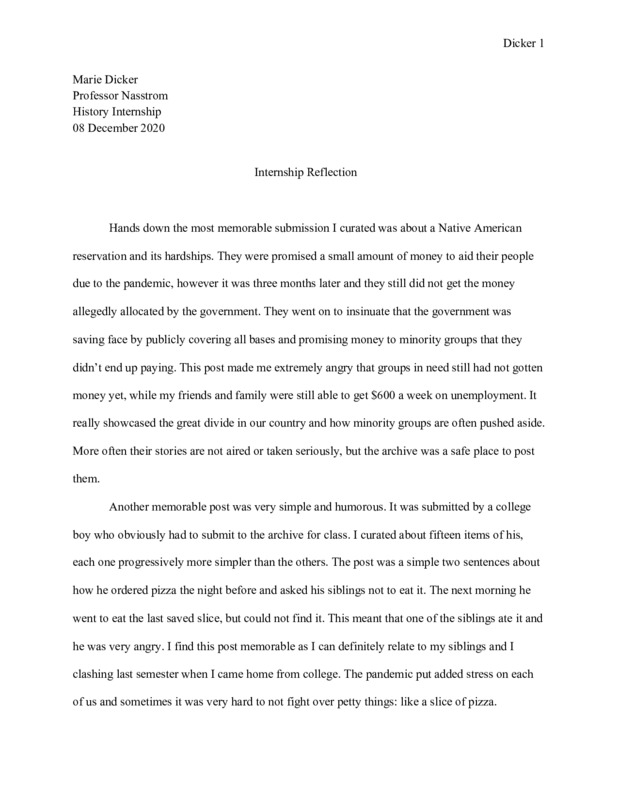 2020-12-08
2020-12-08Final Paper for H396
For the past five months, I have interned with A Journal of the Plague Year to help curate submissions from the year 2020. I have learned a lot about the collecting process and am excited to have been a part of such a great project! -
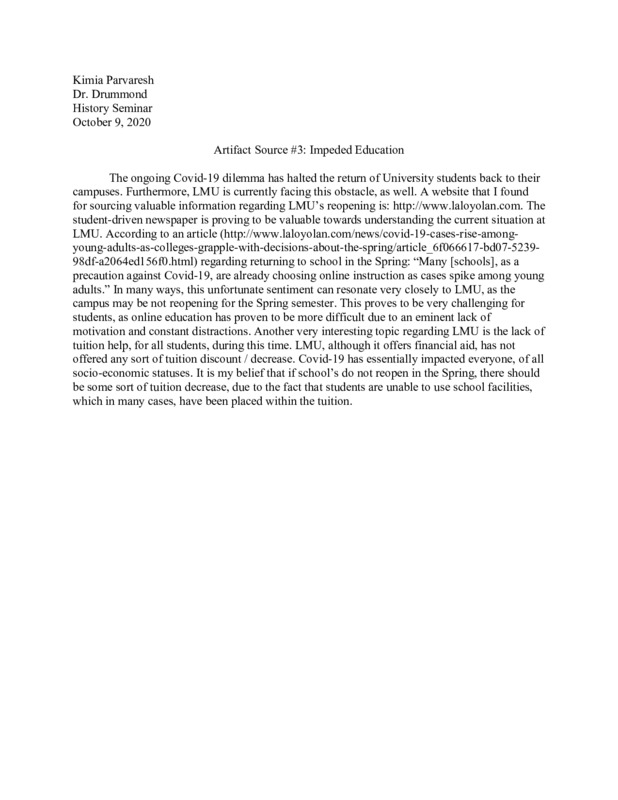 2020
2020Impeded Education as a result of Covid
I am writing about how education of students has been impeded due to the ongoing pandemic. -
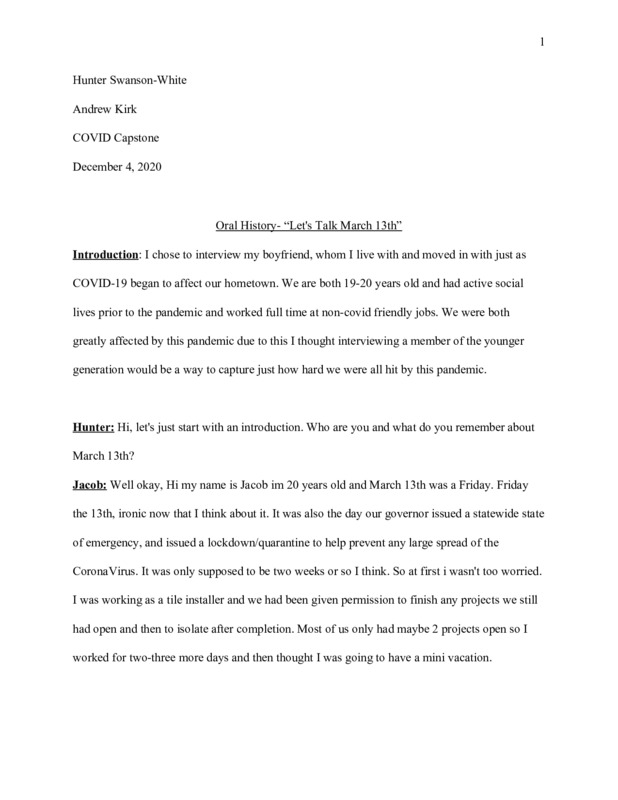 2020-12-03
2020-12-03Lets talk March 13th
I was in my second semester of college when COVID-19 hit, all my classes got moved to online, due to the effects of Covid I ended up having to move out of my home, I switched jobs three times, and as I'm ending my third semester we are still fully remote. There is so much history in just 2020 alone, our children will probably do homework projects about it, or our grandkids will want to interview us for a history report. I want to have something to remember a time i wrote it all down to hopefully help them understand what we actually went through. -
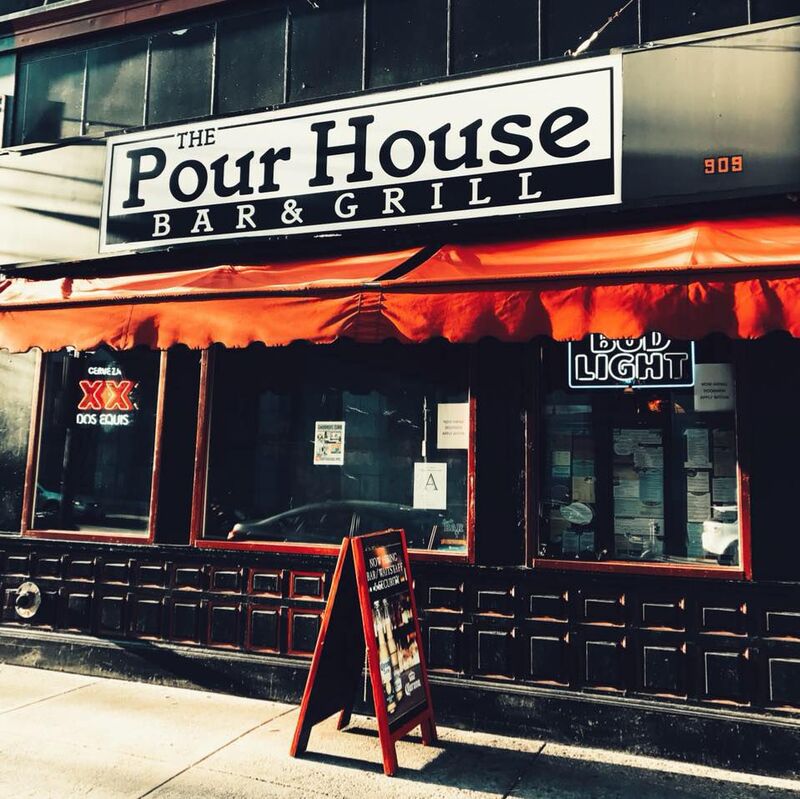 2020-11-18
2020-11-18Shutdown of history
One of the core aspects of Boston is the bustling night life offered on many streets. This is facilitated by the amazing restaurants and bars that are located throughout the city. However, it has been sad to see some of the oldest bars shutting down because of COVID with no plans to reopen even after the pandemic is over. Bars like Whiskey’s, the Pour House, Flat Top Johnny’s and The Field Pub all carry with them history of Boston life with the Pour House even being home to some incredibly famous people’s favorite foods. It saddens me that these places may never open again because I walked past them almost every day that I was living in Boston whether I was going to work or just going on a stroll of the city. These places will close and lose the history that they unknowingly carry, but they will be kept in the eye of history when future generations talk about the economic hardships brought by this pandemic. -
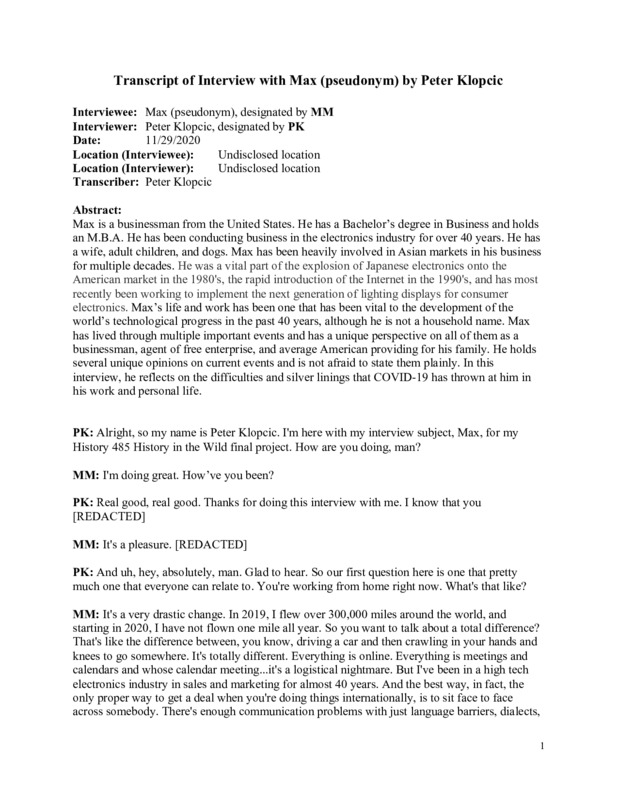 2020-11-29
2020-11-29International Businessman Oral History, 2020/11/29
IMPORTANT NOTE: My professor, Dr. Blake Jones, approved of the anonymity of my interview subject. My subject is highly private and wishes to maintain that anonymity for business and personal reasons. Max is a businessman from the United States. He has a Bachelor’s degree in Business and holds an M.B.A. He has been conducting business in the electronics industry for over 40 years. He has a wife, adult children, and dogs. Max has been heavily involved in Asian markets in his business for multiple decades. He was a vital part of the explosion of Japanese electronics onto the American market in the 1980's, the rapid introduction of the Internet in the 1990's, and has most recently been working to implement the next generation of lighting displays for consumer electronics. Max’s life and work has been one that has been vital to the development of the world’s technological progress in the past 40 years, although he is not a household name. Max has lived through multiple important events and has a unique perspective on all of them as a businessman, agent of free enterprise, and average American providing for his family. He holds several unique opinions on current events and is not afraid to state them plainly. In this interview, he reflects on the difficulties and silver linings that COVID-19 has thrown at him in his work and personal life. -
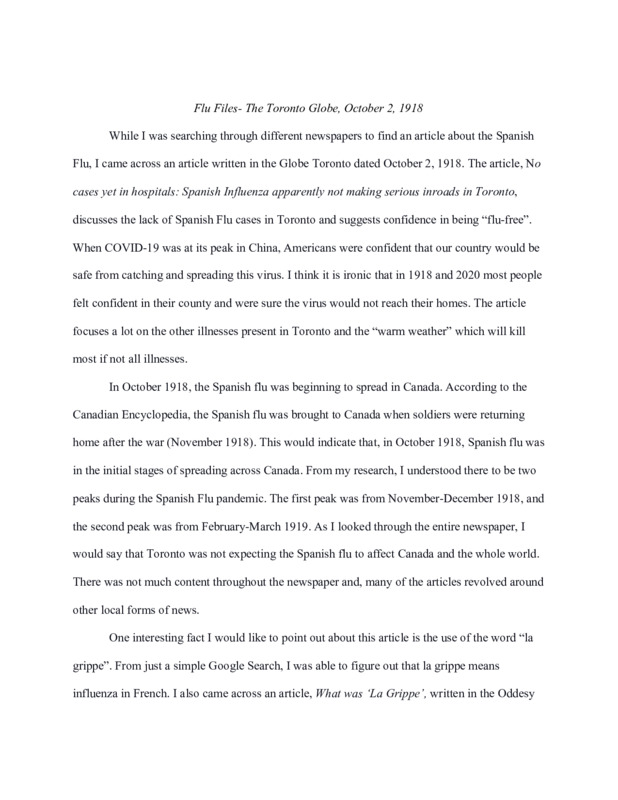 2020-11-19
2020-11-19History does repeat itself
In this short paper, I wrote about similarities between the 1918 Spanish Flu the 2020 COVID-19 pandemic. I analyze an article written in the Toronto Globe on October 2nd, 1918, and compared it to the events that happened in January-February 2020 in the United States. -
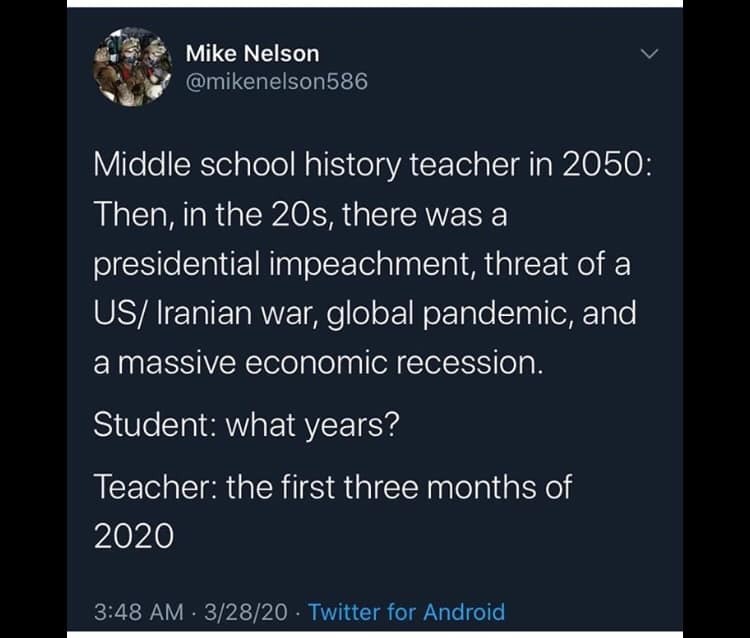 2020-03-28
2020-03-28Future History Teachers
I am hoping to become a high school history teacher and this meme rang true for me. I cannot wait to teach 2020 to future students, it will probably be a class in itself! -
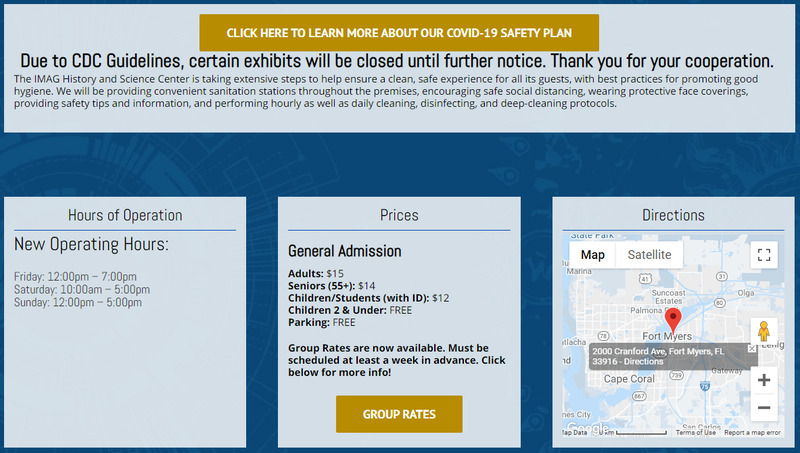 2020-11-02
2020-11-02IMAG History & Science Center COVID-19 Changes
Fort Myers IMAG History & Science Center new hours and exhibit closure web page for COVID-19. There are new hours, groups must register at least a week in advance, and there are exhibits that are remaining closed until further notice. -
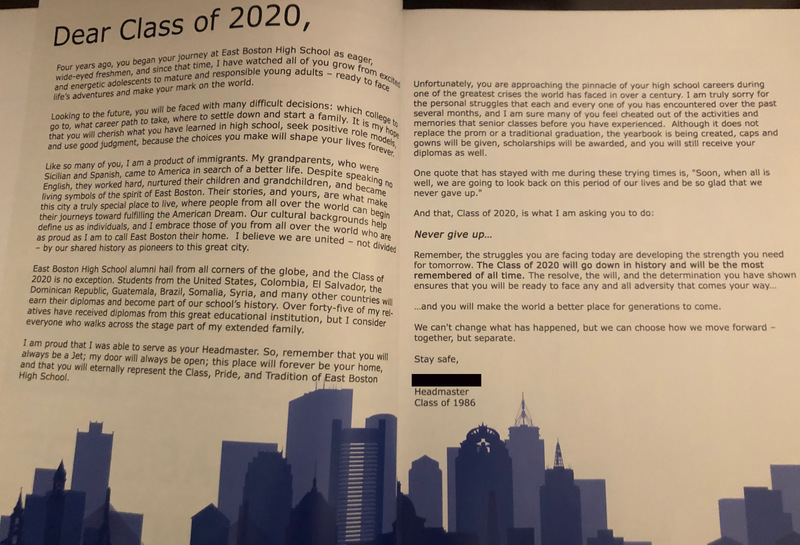 2020-06-27
2020-06-27EHBS’s Class of 2020 Yearbook: Dear Class of 2020
I submitted this image because I think it means a lot to students who graduated during this pandemic. Although it's specific to my school high school, the message is one that all 2020 graduates can relate to. This image is meaningful to me because in the future when I decide to relook at my yearbook I will always remember that I graduated during a life changing pandemic. -
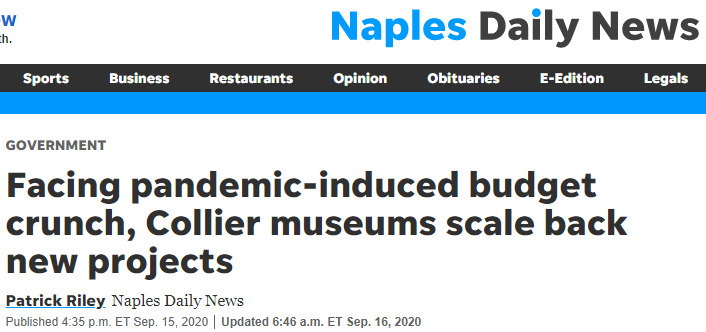 2020-09-15T16:35
2020-09-15T16:35COVID-19’s Impact on Collier County Museum Projects
This is an article written by the Naples Daily News discussing the budget issues that Collier County’s museum system is facing due to COVID-19. Since the museum system is primarily funded through the tourism tax, the funding has plummeted about $300,000 due to the pandemic. Steve Carnell, the director of the public services department, said that the museums have taken the hardest hit - the operating budget had to be reduced by a whole quarter ($464,000). Because of this, a lot of the planned growth of the museum has been put on hold until funding can be secured. The article includes even more information on how operations in the five museums have transformed due to COVID-19. -
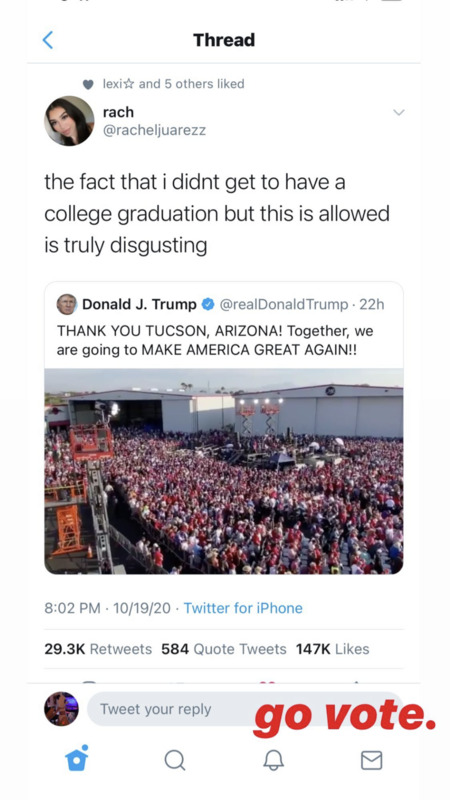 2020-10-20
2020-10-20The new normal
I recently graduated high school class of 2020 . Me and a lot of my friends didn't get a proper prom or graduation.The schools were the first thing the government shut down . Here we are months into a pandemic where new information about the virus is coming about .We have come accustomed to wearing masks and keeping distance. Meanwhile the president of the usa disregards the whole pandemic.While we the citizens have to face what's going on . It's completely unfair and unsafe. Everyone should follow the rules. -
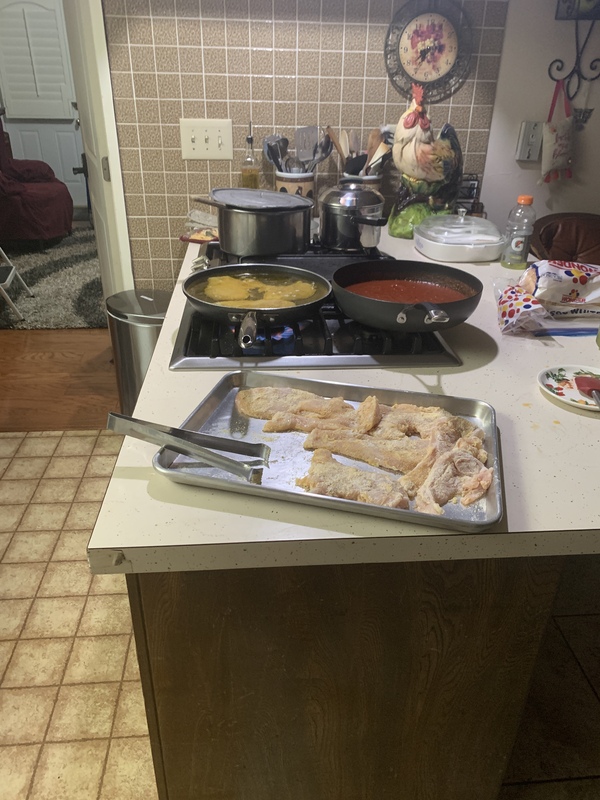 2020-07-15
2020-07-15Food Creations During Quarantine
Pre-Quarantine, there was the opportunity maybe once a week to cook something extravagant for dinner; it was always a treat coming home from work and having the house already filled with some aroma that made instantly remember just how hungry I was. As quarantine limited both other responsibilities and the opportunity to go out to eat, the chances to experiment became more frequent. My grandmother had previously run a restaurant years ago, so this became my opportunity to sous chef and learn some of the tricks of the trade. The infrequent aromas of 2019 were replaced by the almost daily culinary adventures that we went on, be it cooking, baking, or anything in between. For myself, and so many others, baking definitely become a type of release to combat the mood swings and general boredom that quarantine offered up on a daily basis. For my cooking escapades, I would usually stray towards the foods that offered comfort, either through their taste or through their smell. Not being restricted by a mask indoors made the simple act of inhaling that much more enjoyable. There was something that was comforting about having those smells wafting through the house, almost a sense of nostalgia not so much for pre-quarantine but for childhood maybe? -
2020-06-01
Life During Covid-19 Digital Pop-Up Exhibition
Students in Dr. Michael J. Kramer's Digital Methods for Historical Projects seminar at SUNY Brockport share stories about one object from the spring of 2020 during the Covid-19 Pandemic, https://brockportkramer.com/covid19/. Alan Gowans—Getting Past Personal and Public Anxieties Carson Werner—The Day Baseball Stood Still Cecil Frazier—Double Standards Gilberto Diaz III—Memes of COVID-19 Education Jared Rosenberg—Diary From a Mini-tunnel Joe Lasky—The Twitch and the Rosary Jordan Aviles—Music and Other Necessary Items Joseph Massaro—Music as an Escape From (and Turn to) the New Abnormal Leslie Hoag—TikTok-ing History Connections Nate Mundt—Recognizing First Responders Ryan Gibbs—Am I Doing It Right? Samantha Symonds—Saving Lives or Saving the Economy? Sebastian Phipps—Living In a Twenty-First Century Pandemic Steven Willard—Brutal and Grim Realizations Will Secules—Bringing The Office Home -
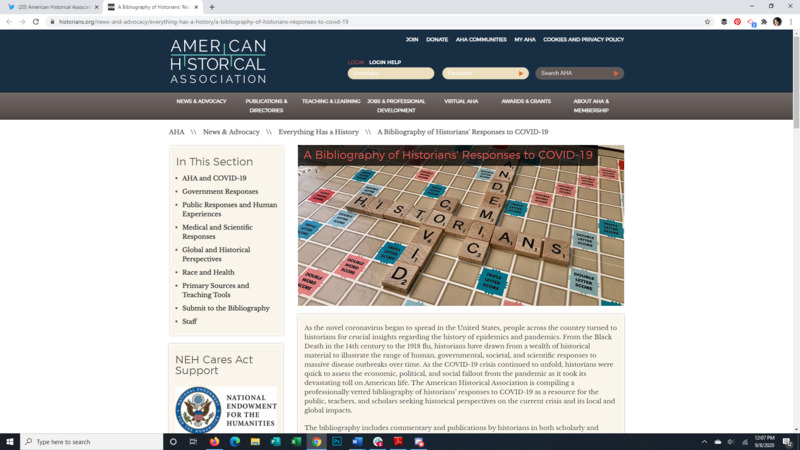 2020-09-08
2020-09-08A Bibliography of Historian's Responses to Covid-19
The American Historical Association has created a bibliography of historians' responses to Covid-19 for later use by the public and academics. -
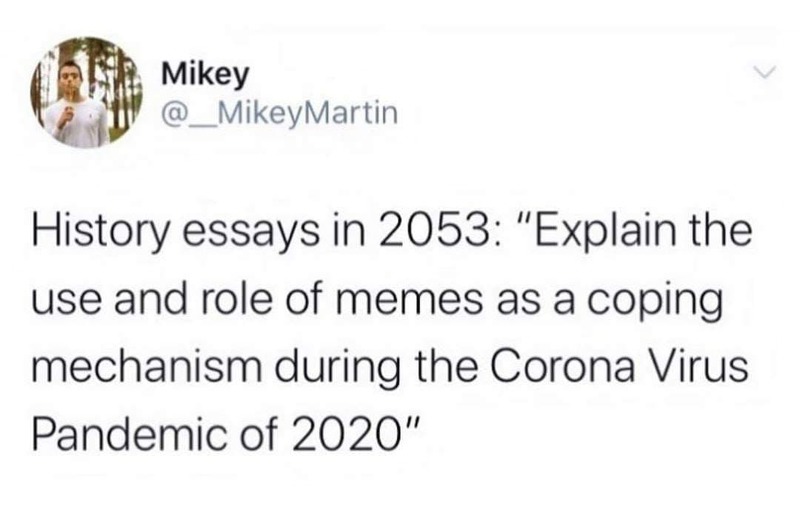 2020-04-01
2020-04-01How we project the role of memes in history of this plagued year
This meme illustrates how we perceive memes right now - as instruments of humor that unify us in a time of crisis. We use these memes to laugh at our own dire situation in a healthy manner. It allows us to escape the constant turmoil for a little while and acknowledge that we are all going through this together, and hope that we come out of this situation stronger and more united.
